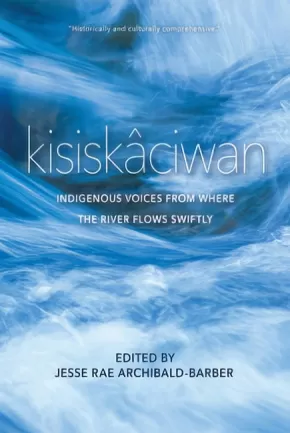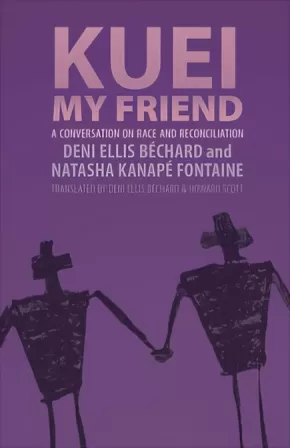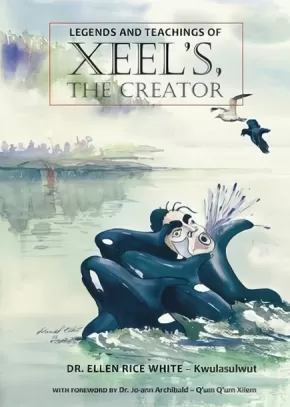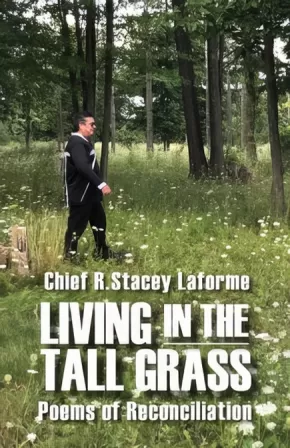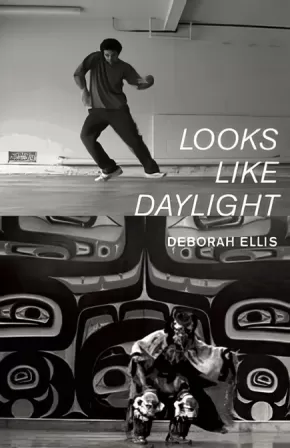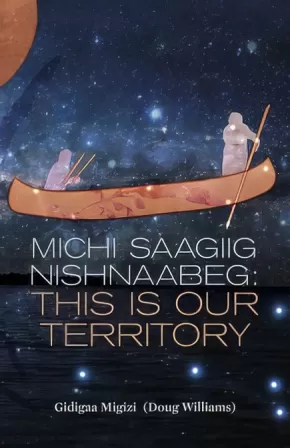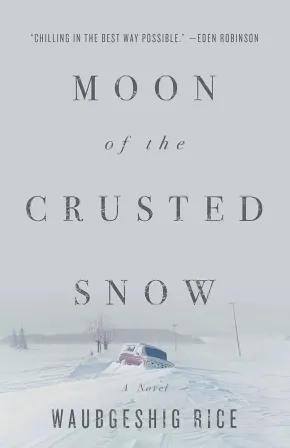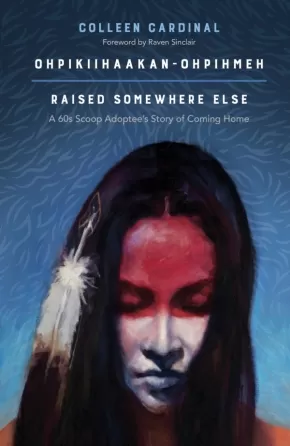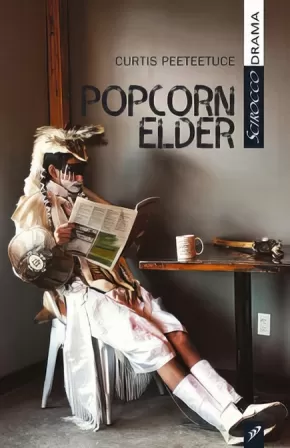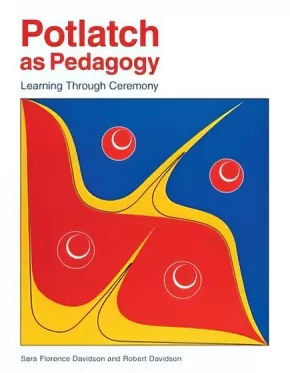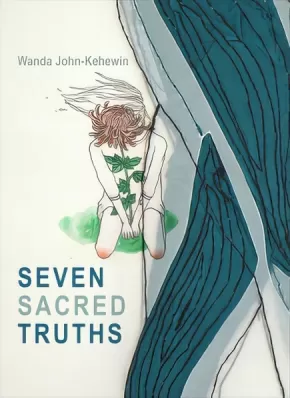Canadian Indigenous Resource Lists - Secondary
Synopsis:
This groundbreaking anthology from territory that is now Saskatchewan, kisiskâciwan, includes rich oral narratives from Cree, Saulteaux, Nakoda, Dakota, Dene, and Métis cultures; early writings from Cree missionaries; speeches and letters by Treaty Chiefs; stories from elders; archival discoveries; and contemporary literary works in all genres.
Historically and culturally comprehensive, voices include Big Bear, Thunderchild, Louis Riel, Gabriel Dumont, Edward Ahenakew, Maria Campbell, Buffy Sainte-Marie, Rita Bouvier, Harold Johnson, Gregory Scofield, Warren Cariou, Louise Halfe, and many more.
Educator Information
The collected works in this anthology would be useful for high school and college/university courses. All the works in this anthology are connected to Saskatchewan in some way. Some themes include Residential Schools, family, resilience, the Sixties Scoop, and coming of age.
Recommended resource for Grades 10-12 for these subjects: Drama, English Language Arts, Social Studies.
Caution: Some of the works in this anthology contain mature subject matter, such as discussion of abuse, violence, sexuality, etc.
Additional Information
300 pages | 6.00" x 9.00"
Authenticity Note: This work is labelled as containing Authentic Indigenous Text because of the contributions from Indigenous Peoples.
Synopsis:
Kuei, My Friend is an engaging book of letters: a literary and political encounter between Innu poet Natasha Kanapé Fontaine and Québécois-American novelist Deni Ellis Béchard. Choosing the epistolary form, they decided to engage together in a frank conversation about racism and reconciliation.
Intentionally positioned within the contexts of the Idle No More movement, Canada’s Truth and Reconciliation Commission, and the National Inquiry into Missing or Murdered Aboriginal Women and Girls, the letters in Kuei, My Friend pose questions in a reciprocal manner: how can we coexist if our common history involves collective and personal episodes of shame, injury, and anger? how can we counteract misunderstandings of the Other, which so often lead to contempt and rejection? how can we educate non-Indigenous communities about the impact of cultural genocide on the First Peoples and the invisible privileges resulting from historical modes of domination?
In an attempt to open a sincere and productive dialogue, Kanapé Fontaine and Ellis Béchard use their personal stories to understand words and behaviours that are racist or that result from racism. With the affection and intimacy of a friend writing to a friend, Natasha recounts to her addressee her discovery of the residential schools, her obsession with the Oka Crisis of 1990, and her life on the Pessamit reserve. Reciprocating, Deni talks about his father’s racism, the segregation of African-Americans and civil rights, and his identity as a Québécois living in the English-speaking world.
By sharing honestly even their most painful memories, these two writers offer an accessible, humanist book on the social bridge-building and respect for difference. Kuei, My Friend is accompanied by a chronology of events, a glossary of relevant terms in the Innu language, and, most importantly, a detailed teacher’s guide that includes topics of discussion, questions, and suggested reflections for examination in a classroom setting.
Educator Information
Recommended resource for Grades 10-12 in these areas: BC First Peoples, Contemporary Indigenous Studies, English First Peoples, English Studies, Literary Studies.
Includes an Innu-aimun glossary and a teacher's guide to help classroom discussion facilitation.
Recommended in the Canadian Indigenous Books for Schools 2019-2020 resource list as being useful for grades 10 to 12 for English Language Arts and Social Studies.
This resource is also available in French: Kuei, je te salue: Conversation sur le racisme.
Additional Information
176 pages | 6.21" x 8.46" | Translated by & Deni Ellis Béchard & Howard Scott
Synopsis:
Snuneymuxw Elder and storyteller Ellen White shares four stories handed down to her from her grandparents and their ancestors.
Legends and Teachings of Xeel’s, the Creator contains four short stories centering around themes such as communication, connection, teaching and respect. The stories featured include: “The Creator and the Flea Lady, The Boys Who Became a Killer Whale, The Sockeye That Became a Rainbow, and The Marriage of the Seagull and the Crow.” Each story is accompanied by a companion piece developed by the storyteller Ellen Rice White (Kwulasulwut) which provides cultural context and an explanation of some of the lessons found in each story.
In the story “The Creator and the Flea Lady”, a Flea mother asks for help saving her premature infant. The Flea woman is reminded of her connection to the many energies surrounding her by Xeel’s and the energies themselves.
In “Boys Who Became a Killer Whale”, eager learners frustrated with the pace and demeanour of their traditional teachers reach beyond what they know and encounter tragedy.
In both the “Sockeye That Became a Rainbow” and “The Marriage of the Seagull and the Crow”, respect and acceptance of the differences of others are central components of the stories. The protagonists struggle with their relationships and the differences they have with their partners.
Educator Information
Please Note: These are a set of uncensored, traditional stories. The content is meant to provide traditional teachings.
Each of the four stories in the book is accompanied by a discussion piece that provides cultural context and questions for the reader to consider. Huĺq̓ umín̓ um̓ language is used throughout. A glossary can be found at the back of the book.
Some subject matter may not be suitable for some readers.
Recommended in the Canadian Indigenous Books for Schools 2019-2020 resource list as being useful for grades 9 to 12 for English Language Arts.
Additional Information
112 pages | 6.75" x 9.75"
Synopsis:
“We should not have to change to fit into society the world should adapt to embrace our uniqueness.” -- Chief Stacey Laforme
In Living in the Tall Grass: Poems of Reconciliation, Chief Stacey Laforme gives a history of his Anishinaabe people through stories and poetry to let Canadians see through the eyes of Indigenous people. Living in the Tall Grass is written in a way that makes the reader feel he or she might be sitting down with Chief Laforme, sharing experiences from their lives. Some poems share humour, while others express pain, though each comes from the heart.
Reviews
"Laforme is a high-profile leader, attending scores of events, large and small in Ontario and gently reminding listeners that most of the southern part of the province is the traditional homelands of the Mississaugas of the New Credit. True to his belief in the longer-lasting impact of the arts, he’ll often open a speech with a verse. “The future lies in the arts, and it lies in all our youth, not just the Indigenous youth,” he says. “Arts make change … if we can share a moment through the arts whether its song, dance, poetry, painting, it transcends even language barriers." — Steve Milton, The Hamilton Spectator
Educator Information
Recommended for Grades 5-12 for English Language Arts.
Caution: Some poems touch on violence and suicide.
Themes: hope, the environment, Residential Schools.
Additional Information
160 pages | 5.50" x 8.50" | duotone photographs
Synopsis:
After her critically acclaimed books of interviews with Afghan, Iraqi, Israeli and Palestinian children, Deborah Ellis turns her attention closer to home. For two years she traveled across the United States and Canada interviewing Native children. The result is a compelling collection of interviews with children aged nine to eighteen. They come from all over the continent, from Iqaluit to Texas, Haida Gwaai to North Carolina, and their stories run the gamut — some heartbreaking; many others full of pride and hope.
You’ll meet Tingo, who has spent most of his young life living in foster homes and motels, and is now thriving after becoming involved with a Native Friendship Center; Myleka and Tulane, young artists in Utah; Eagleson, who started drinking at age twelve but now continues his family tradition working as a carver in Seattle; Nena, whose Seminole ancestors remained behind in Florida during the Indian Removals, and who is heading to New Mexico as winner of her local science fair; Isabella, who defines herself more as Native than American; Destiny, with a family history of alcoholism and suicide, who is now a writer and powwow dancer.
Many of these children are living with the legacy of the residential schools; many have lived through the cycle of foster care. Many others have found something in their roots that sustains them, have found their place in the arts, the sciences, athletics. Like all kids, they want to find something that engages them; something they love.
Deborah briefly introduces each child and then steps back, letting the kids speak directly to the reader, talking about their daily lives, about the things that interest them, and about how being Native has affected who they are and how they see the world.
As one reviewer has pointed out, Deborah Ellis gives children a voice that they may not otherwise have the opportunity to express so readily in the mainstream media. The voices in this book are as frank and varied as the children themselves.
Educator Information
Recommended for ages 12 and up.
Curriculum Connections: English, Geography, Humanities and Social Studies, Indigenous Studies, Civics and Careers, History
Synopsis:
In this deeply engaging oral history, Doug Williams, Anishinaabe elder, teacher and mentor to Leanne Betasamosake Simpson, recounts the history of the Michi Saagiig Nisnaabeg, tracing through personal and historical events, and presenting what manifests as a crucial historical document that confronts entrenched institutional narratives of the history of the region. Edited collaboratively with Simpson, the book uniquely retells pivotal historical events that have been conventionally unchallenged in dominant historical narratives, while presenting a fascinating personal perspective in the singular voice of Williams, whose rare body of knowledge spans back to the 1700s. With this wealth of knowledge, wit and storytelling prowess, Williams recounts key moments of his personal history, connecting them to the larger history of the Anishinaabeg and other Indigenous communities.
Reviews
"This book gives us an alternative perspective on historical record that is both personal and collective. Doug Williams reminds us of the generations of Indigenous knowledge keepers and of a history that stretches back prior to European contact-including the disruption of contact. This book is his gift to the Michi Saagiig and to all Anishinaabek. It is also a gift to Canadians who want to help decolonize this country. - Armand Garnet Ruffo
"Storytelling is not just a gift. It's not just an art. It's also a responsibility: the weaving together of history, philosophy, culture and humour frequently highlighting a culture's perspective on the world. Doug Williams has been doing this as long as I can remember. He lives the culture, not just talks about it. The people and places he talks about in Michi Saagiig Nishnaabeg are more a part of our history then all the things going on in Ottawa." - Drew Hayden Taylor
Educator Information
Recommended in the Canadian Indigenous Books for Schools 2019-2020 resource list as being useful for grades 9 to 12 for Creative Writing, English Language Arts, Media Studies, and Social Studies.
Additional Information
168 pages | 5.50" x 8.50"
Synopsis:
Cole Harper is struggling to settle into life in Wounded Sky First Nation. He may have stopped a serial killer but the trouble is far from over. A creature lurks in the shadows of Blackwood Forest, the health clinic is on lockdown by a mysterious organization, and long-held secrets threaten to bubble to the surface. Can Cole learn the truth about his father's death? Why won't Choch give him a straight answer? Where the heck is Jayne? Oh, and high school sucks.
Reviews
"Cole, 17, is an interesting main character caught in a web of deception and surrounded by threatening people and circumstances. One of the main themes of the book is Cole’s mental health and his need to deal with sometimes crippling anxiety. There are times he can talk himself down, times he needs medication and times that the support from his friends help him cope. Robertson speaks from personal experience, and so his portrayal of Cole is filled with realism as well as understanding and empathy." — CM: Canadian Review of Materials
"The ending...is so unexpected that readers will eagerly anticipate a third volume. A satisfying continuation of a moody, stylish series." — Kirkus Reviews
"Robertson’s knack for writing distinct teenage voices also provides important character development — a tough requirement for the middle volume of any trilogy, in which plot resolution is usually minimal. The dialogue between Cole and his friends also uncovers the different ways in which folks grieve both those they’ve lost and the culture they’ve left behind. "— Nyala Ali, Winnipeg Free Press
Educator & Series Information
Monsters is the second novel in David A. Robertson's The Reckoner trilogy. It is the follow-up to Strangers, and is proceeded by Ghosts.
The Reckoner series is recommended for ages 12 to 18.
The Canadian Indigenous Books for Schools list recommends this resource for Grades 9-12 English Language Arts.
This book is available in French: La trilogie Reckoner - Tome 2: Monstres
Additional Information
260 pages | 5.50" x 8.50"
Synopsis:
A daring post-apocalyptic novel from a powerful rising literary voice.
With winter looming, a small northern Anishinaabe community goes dark. Cut off, people become passive and confused. Panic builds as the food supply dwindles. While the band council and a pocket of community members struggle to maintain order, an unexpected visitor arrives, escaping the crumbling society to the south. Soon after, others follow.
The community leadership loses its grip on power as the visitors manipulate the tired and hungry to take control of the reserve. Tensions rise and, as the months pass, so does the death toll due to sickness and despair. Frustrated by the building chaos, a group of young friends and their families turn to the land and Anishinaabe tradition in hopes of helping their community thrive again. Guided through the chaos by an unlikely leader named Evan Whitesky, they endeavor to restore order while grappling with a grave decision.
Blending action and allegory, Moon of the Crusted Snow upends our expectations. Out of catastrophe comes resilience. And as one society collapses, another is reborn.
Reviews
“This slow-burning thriller is also a powerful story of survival and will leave readers breathless.” — Publishers Weekly
"Rice seamlessly injects Anishinaabe language into the dialogue and creates a beautiful rendering of the natural world. . . This title will appeal to fans of literary science fiction akin to Cormac McCarthy as well as to readers looking for a fresh voice in indigenous fiction.” — Booklist
“Perfect for those who read Iain Reid's Foe this summer and are looking for something in the same vein.” — The Globe and Mail
“The creeping tension and vividly drawn landscapes make Waubgeshig Rice’s characters choices all the more real.” — Toronto Star
“Moon of the Crusted Snow asks how do we live in a good way during the collapse of the infrastructure that supports modern life? For Evan Whitesky, the answer lies in rekindling Ojibwe, the old ways, language and culture. For other characters, when the food runs out, all options are on the table, no matter how gruesome. As the tensions between those surviving the end of modern civilization build to a harrowing conclusion, Rice deftly weaves tender family moments with his brutal survival scenes in the unforgiving northern Ontario winter. Chilling in the best way possible.” — Eden Robinson, award-winning author of Monkey Beach and Son of a Trickster
Educator Information
Recommended in the Canadian Indigenous Books for Schools 2019-2020 resource list as being useful for grades 10 to 12 for English Language Arts.
Contains strong language and mature subject matter relating to violence and death.
Additional Information
224 pages | 5.50" x 8.50"
Synopsis:
In a series of inspirational profiles, Cora Voyageur celebrates 100 remarkable Indigenous Albertans whose achievements have enriched their communities, the province, and the world.
As a child, Cora rarely saw Indigenous individuals represented in her history textbooks or in pop culture. Willie Nelson sang “My Heroes Have Always Been Cowboys,” but Cora wondered, where were the heroes who looked like her? She chose the title of her book in response, to help reflect her reality.
In fact, you don’t have to look very hard to find Indigenous Albertans excelling in every field, from the arts to business and everything in between. Cora wrote this book to ensure these heroes receive their proper due.
Some of the individuals in this collection need no introduction, while others are less well known. From past and present and from all walks of life, these 100 Indigenous heroes share talent, passion, and legacies that made a lasting impact.
Read about:
- Douglas Cardinal, the architect whose iconic, flowing designs grace cities across Alberta, across Canada, and in Washington, DC,
- Nellie Carlson, a dedicated activist whose work advanced the cause of Indigenous women and the education of Indigenous children,
- Alex Janvier, whose pioneering work has firmly established him as one of Canada’s greatest artists,
- Moostoos, “The Buffalo,” the spokesperson for the Cree in Treaty 8 talks who fought tirelessly to defend his People’s rights,
- And many more.
Educator Information
Recommended in the Canadian Indigenous Books for Schools 2019-2020 resource list for grades 10 to 12 for these subject areas: English Language Arts, Social Studies.
This book focuses on Indigenous Albertans.
Additional Information
240 pages | 5.90" x 9.00"
Synopsis:
During the 60s Scoop, over 20,000 Indigenous children in Canada were removed from their biological families, lands and culture and trafficked across provinces, borders and overseas to be raised in non-Indigenous households.
Ohpikiihaakan-ohpihmeh — Raised Somewhere Else delves into the personal and provocative narrative of Colleen Cardinal’s journey growing up in a non- Indigenous household as a 60s Scoop adoptee. Cardinal speaks frankly and intimately about instances of violence and abuse throughout her life, but this book is not a story of tragedy. It is a story of empowerment, reclamation and, ultimately, personal reconciliation. It is a form of Indigenous resistance through truth-telling, a story that informs the narrative on missing and murdered Indigenous women, colonial violence, racism and the Indigenous child welfare system.
Reviews
“With Canadians slowly awakening to the reality of the 60s Scoop and its ongoing repercussions, Cardinal’s inspiring work here is essential reading and will be an integral resource for generations to come.” — Waubgeshig Rice, author of Legacy
“Offers a window through which readers can see why cultural suppression is such a dark chapter in Canada’s history.” — Winnipeg Free Press
“I highly recommend reading this story for anyone interested in learning more about the Sixties Scoop and understanding what’s really happening under the stereotypes put on many Indigenous by those who do not truly understand.” — All Booked
Educator Information
The Canadian Indigenous Books for Schools list recommends this resource for Grades 10-12 for English Language Arts.
Additional Information
214 pages | 6.00" x 9.00" | Foreward by Raven Sinclair
Synopsis:
Echo Desjardins, a 13-year-old Métis girl adjusting to a new home and school, is struggling with loneliness while separated from her mother. Then an ordinary day in Mr. Bee’s history class turns extraordinary, and Echo’s life will never be the same. During Mr. Bee’s lecture, Echo finds herself transported to another time and place—a bison hunt on the Saskatchewan prairie—and back again to the present. In the following weeks, Echo slips back and forth in time. She visits a Métis camp, travels the old fur-trade routes, and experiences the perilous and bygone era of the Pemmican Wars.
Educator & Series Information
Recommended for ages 12+ by the publisher.
Pemmican Wars is the first graphic novel in the A Girl Called Echo series.
Books in this series include:
Volume 1: Pemmican Wars
Volume 2: Red River Resistance
Volume 3: Northwest Resistance
Volume 4: Road Allowance Era
The Canadian Indigenous Books for School list recommends this for Grades 5-12 for these subject areas: Arts Education, English Language Arts, Social Studies.
This book is available in French: Elle s'appelle Echo Tome 1: La guerre du Pemmican
Additional Information
48 pages | 6.50" x 10.00"
Synopsis:
Darren, newly on parole from prison, has been ordered by the court to live with his father on the rez. Wally and Darren have always had a contentious relationship: Wally is a problem drinker, and Darren's got a short fuse. But Wally tells his son that he's changed, has stopped drinking and started going to ceremony, and he urges Darren to do the same. As old family secrets start to be revealed, the father and son grapple with complex issues.
Popcorn Elder examines the problem of "plastic shamans" who offer spirituality at a price. It looks at a community working to face its demons and heal past trauma. And at the heart of the play is the story of a father and son, filled with anger, guilt, and pain, seeking connection and reconciliation.
Through flashbacks, a combination of Cree and English, and an unforgettable cast of characters, Popcorn Elder tells the story of one family's journey toward hope.
Educator Information
Contains sexual abuse references and explicit language.
Recommended in the Canadian Indigenous Books for Schools 2019-2020 resource list for grades 10 to 12 for Acting, Drama, English Language Arts, and Social Studies.
Additional Information
72 pages | 5.50" x 8.50"
Synopsis:
Inspired by Haida ceremonial practice, father and daughter present a model for learning that is holistic, relational, practical, and continuous.
In 1884, the Canadian government enacted a ban on the potlatch, the foundational ceremony of the Haida people. The tradition, which determined social structure, transmitted cultural knowledge, and redistributed wealth, was seen as a cultural impediment to the government’s aim of assimilation.
The tradition did not die, however; the knowledge of the ceremony was kept alive by the Elders through other events until the ban was lifted. In 1969, a potlatch was held. The occasion: the raising of a totem pole carved by Robert Davidson, the first the community had seen in close to 80 years. From then on, the community publicly reclaimed, from the Elders who remained to share it, the knowledge that has almost been lost.
Sara Florence Davidson, Robert’s daughter, would become an educator. Over the course of her own education, she came to see how the traditions of the Haida practiced by her father—holistic, built on relationships, practical, and continuous—could be integrated into contemporary educational practices. From this realization came the roots for this book.
Reviews
"Potlatch as Pedagogy is wonderfully wise, hopeful, heartful, eloquent, and loving! Every teacher candidate and teacher needs to read this book. The authors expertly evoke the history and culture of the Haida as they call forth the sadness as well as the hope and joy of generations of people who were misunderstood and mistreated. In this time of Truth and Reconciliation, we all need to attend to this book." —Dr. Carl Leggo, Professor, Department of Language and Literacy Education, University of British Columbia
Educator Information
For all teachers.
Recommended in the Canadian Indigenous Books for Schools 2019-2020 resource list as a Teacher Resource for grades 10 to 12 with reference to Social Studies.
Additional Information
200 pages | 7.00" x 9.00"
Synopsis:
Echo Desjardins is adjusting to her new home, finding friends, and learning about Métis history. She just can’t stop slipping back and forth in time. One ordinary afternoon in class, Echo finds herself transported to the banks of the Red River in the summer of 1869. All is not well in the territory as Canadian surveyors have arrived to change the face of territory, and Métis families, who have lived there for generations, are losing access to their land. As the Resistance takes hold, Echo fears for her friends and the future of her people in the Red River Valley.
Educator & Series Information
Recommended for grades 5 to 9.
Red River Resistance is volume two in the graphic novel series, A Girl Called Echo, by Katherena Vermette.
Books in this series include:
Volume 1: Pemmican Wars
Volume 2: Red River Resistance
Volume 3: Northwest Resistance
Volume 4: Road Allowance Era
Recommended in the Canadian Indigenous Books for Schools 2019-2020 resource list as being useful for grades 5-12 with regard to these subjects: English Language Arts, Art Education, Social Studies.
This book is available in French: Elle s'appelle Echo Tome 2: La guerre du Pemmican
Additional Information
47 pages | 6.50" x 10.00"
Synopsis:
Seven Sacred Truths explores the perspective of an Indigenous Woman on a continuous journey of healing from trauma.
Seven Sacred Truths presents a powerful exploration of an Indigenous woman's healing journey. Seeing the world through "brown" eyes, poet Wanda John-Kehewin makes new meaning of the past, present, and future through a consideration of Love, Wisdom, Truth, Honesty, Respect, Humility, and Courage. By sharing her views on these Seven Sacred Truths and what they meant to her growing up, John-Kehewin instigates a therapeutic process of restoration and transformation. Her Seven Sacred Truths uncovers new meaning in the written word - meaning that can be shared with others who have lived trauma or who want insight into it. John-Kehewin strives to create a safe space and provide the opportunity to experience another perspective; she invites readers to embark on their own healing journeys. The closer you are to the truth, she writes, the freer you become.
Wanda John-Kehewin uses writing as a therapeutic medium to understand and respond to the near-decimation of First Nations cultures and traditions.
Educator Information
Recommended in the Canadian Indigenous Books for Schools 2019-2020 resource list for grades 10 to 12 for English Language Arts.
Additional Information
120 pages | 5.50" x 8.50"

